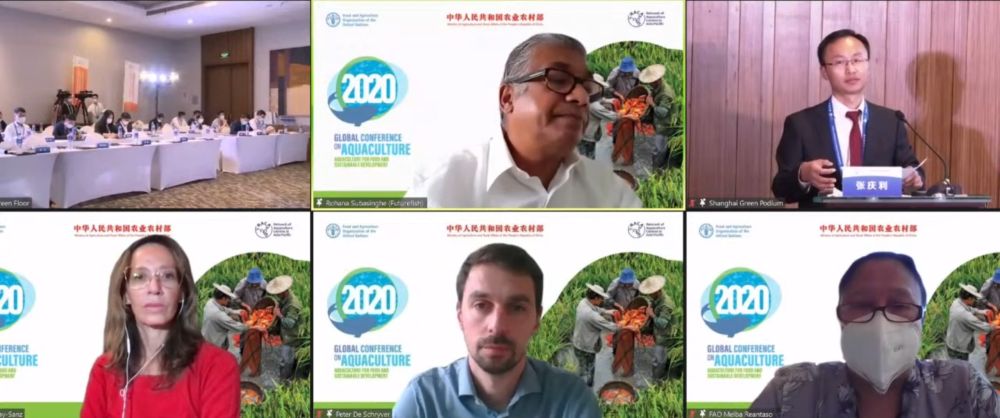Global Conference on Aquaculture Millennium +20
26 September 2021 | 4236 views | China, Emerging Global Issues, Food Security, Safety and Certification, Gender, Genetics and Biodiversity, Governance and Policy, Health and Biosecurity, Inland aquaculture, Livelihoods, gender and social issues, Markets and trade, Nutrition and feeding, Education and Training

Feeding an expected global population of 9 billion by 2050 is a daunting challenge that is engaging hundreds of millions of farmers, food processors, traders, researchers, technical experts, and leaders the world over. Fish and other aquatic products from aquaculture can and will play a major role in meeting the dietary demands of all people, while also meeting the food security needs of the poorest.
Farmed fish and plants have long contributed to healthy diets, poverty alleviation and rural development. It is only recently, however, that aquaculture has grown to be the leading source of aquatic food, which is expected to meet expanding global dietary demands while also addressing the food security needs of the poor.
To realise the maximum contributions of the aquaculture sector toward achieving the targets set by the Sustainable Development Goals and Agenda 2030, coordinated and accelerated actions are required. Not only must these actions increase sustainable production, but also address the broader value chain, markets, and decent employment.
To accelerate growth and ensure the sustainability of future aquaculture, FAO, NACA and the Chinese Ministry of Agriculture and Rural Affairs invited governments, business, academia and civil society together for the Global Conference on Aquaculture Millennium +20 (GCA +20) under the theme “Aquaculture for Food and Sustainable Development”, to discuss the policy and technology innovations, investment opportunities and fruitful areas of cooperation in aquaculture for food and sustainable development.
The event was the fourth in a series of development-oriented conferences that began with the FAO Technical Conference on Aquaculture (Kyoto, 1976), the Global Conference on Aquaculture in the 3rd Millennium (Bangkok, 2000), and the Global Conference on Aquaculture 2010 (Phuket).
The goals of the conference were to:
- Review status, trends, and emerging issues in aquaculture development.
- Identify opportunities and challenges in aquaculture and its contributions to sustainable development.
- Evaluate the progress of aquaculture development considering previously recommended strategies and policies at regional and global level.
- Build consensus on priorities and actions needed for advancing aquaculture as a global, sustainable, and competitive food production sector.
To provide context for the discussions, an extensive series of review papers were prepared by teams of recognised experts. These included a series of regional reviews and a global synthesis of the status of aquaculture; and a series of thematic reviews addressing aquaculture systems, innovation, aquaculture’s contribution to the Sustainable Development Goals, feed and feeding, genetic resources and seed supply, biosecurity, governance, social and human dimensions of aquaculture, and value chains and market access. The regional review and thematic review papers, which were open for public comment, are available for download from the conference website.
Despite delays due to the pandemic, the GCA +20 was successfully held as a hybrid event from 22-25 September, with physical participation at the venue in Shanghai, China, and international participation via video conference.
The conference kicked off on the 22nd with a Workshop on Sustainable Development Goal-aligned Artemia Aquaculture.
A total of 1,728 people participated in the event, of which 500 were physically present in Shanghai. Around 45% of participants were academics, 30% were from civil society groups and NGOs, 15% were from the private sector and 10% public sector. Across all participants, 41% identified as female and 52% as youth.
The Shanghai Declaration
Her Royal Highness Princess Maha Chakri Sirindhorn graced the final session of the conference and the formal adoption of the Shanghai Declaration, expressing her support for aquaculture as a solution to achieve Sustainable Development Goal #2, Zero Hunger.
A key output from the GCA +20, the Shanghai Declaration is a call to action that highlights the principles and strategic pathways to maximise the contribution of sustainable aquaculture in achieving the Sustainable Development Goals, with a special focus on “Leaving no one behind”. The Declaration will guide all players in the development of the industry and towards optimisation of the sector’s contribution to food security and livelihoods in line with the UN’s 2030 Agenda for Sustainable Development.
The Declaration recognises the capacity of aquaculture for further growth, while stressing the need to prevent that growth from impacting ecosystems and biodiversity, animal health and welfare, and social inequalities.
At the time of writing, 42 organisations have submitted written pledges expressing their support for the Shanghai Declaration and their commitment to addressing issues it contains, including universities, research institutes, international organisations, civil society organisations, industry associations and private sector companies.
The Shanghai Declaration and pledges of support are available for download from the conference website.
NACA would like to thank all who contributed to the GCA +20 as participants, authors, speakers or in organising the event, our partners at FAO, the Ministry of Agriculture and Rural Affairs PRC, Shanghai Ocean University and the legion of administrators, translators, editors and others that made it possible.
Creative Commons Attribution.